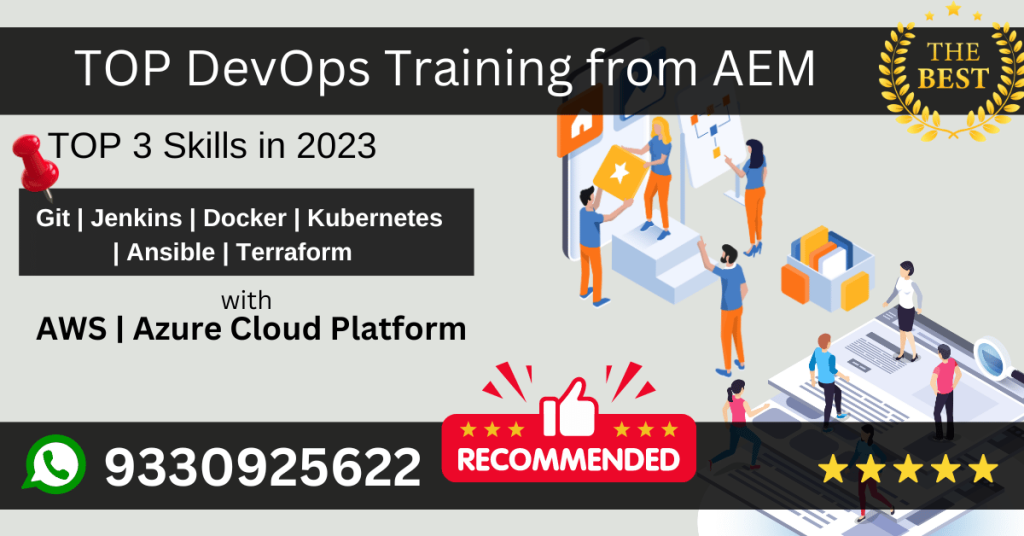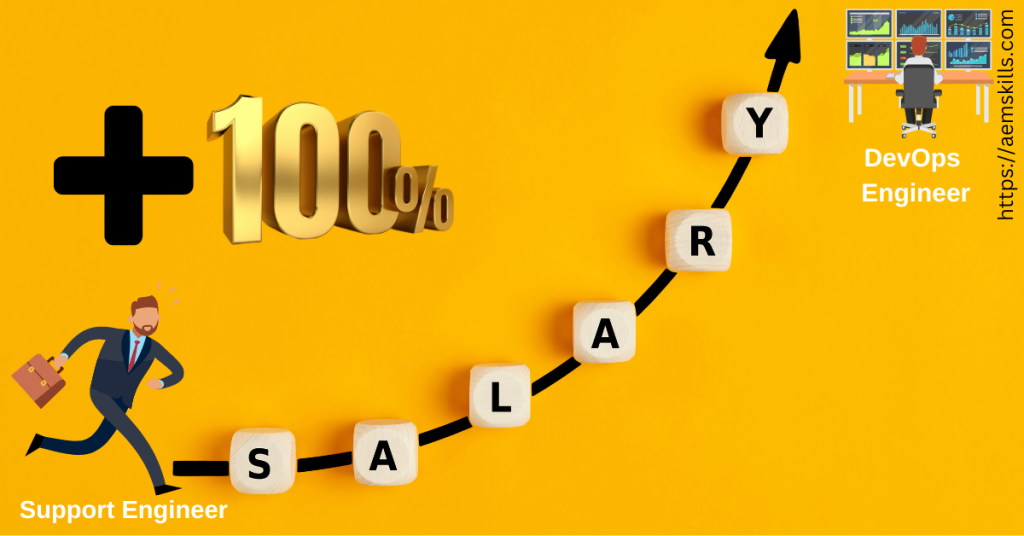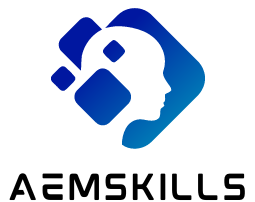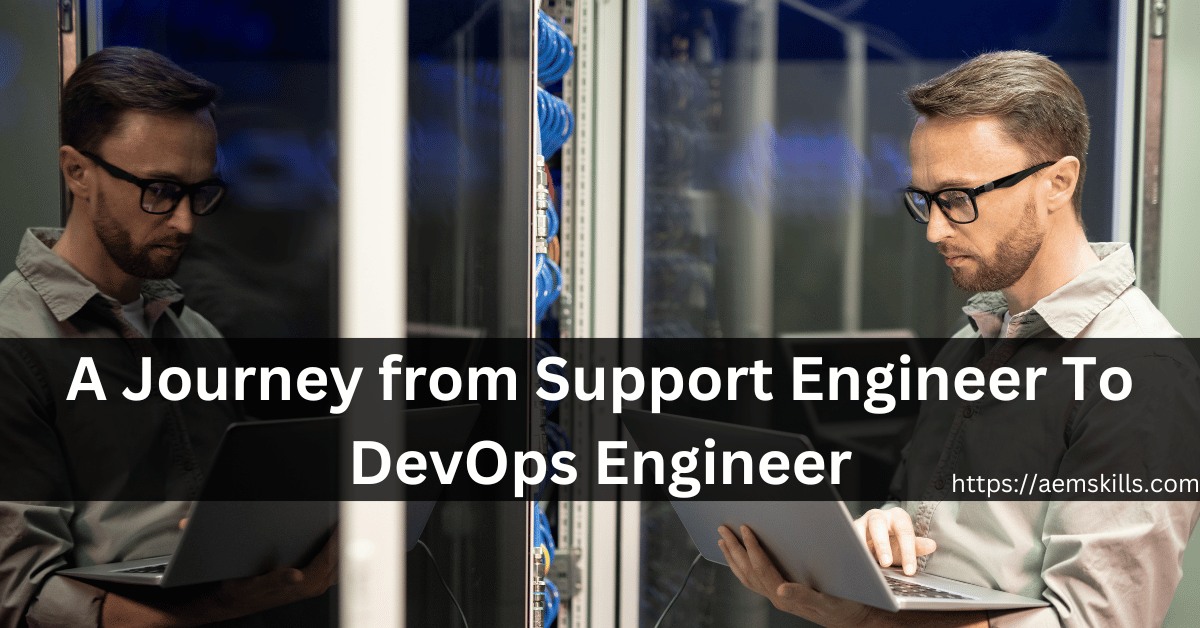Can a Support Engineer become a DevOps Engineer in Kolkata?
Yes, a Support Engineer can certainly become a DevOps Engineer in Kolkata, or in any location for that matter. The transition from support to DevOps is possible with the right skills, mindset, and dedication.
A Journey from Support Engineer To DevOps Engineer in Kolkata is highly Possible!
I totally get where you’re coming from – thinking about shifting from a Support Engineer to a DevOps Engineer role in Kolkata might feel like a big leap. But let me reassure you, it’s totally doable and even exciting! Your experience in support already gives you a fantastic head start. You’re a problem-solving whiz, and your knack for understanding what users really need is gold in the world of DevOps, where teamwork and user-friendly solutions matter.
The cool part? Kolkata’s tech scene is buzzing, with local meetups and opportunities galore. All you need is a bit of upskilling – learning tools like automation thingamajigs, scripting languages, and cloud platforms. Don’t worry, you won’t be alone on this journey. There’s a bunch of learning resources online and a whole bunch of like-minded folks you can connect with.

So, don’t stress. With a can-do attitude and a dash of curiosity, you’re on your way to embracing a whole new adventure that’ll not only elevate your career but also let you bring your unique skills to the DevOps table.
A general comparison table outlining the roles of a Support Engineer and a DevOps Engineer
| Aspect | Support Engineer | DevOps Engineer |
|---|---|---|
| Primary Focus | Troubleshooting and resolving technical | Automating and streamlining the |
| issues for end-users and maintaining | software development and deployment | |
| system stability. | processes. | |
| Responsibilities | – Responding to user inquiries and | – Designing, implementing, and managing |
| technical issues. | CI/CD pipelines for efficient | |
| – Providing technical assistance and | deployments. | |
| support via various channels. | – Automating infrastructure provisioning | |
| – Diagnosing and resolving hardware and | and management using IaC. | |
| software problems. | – Collaborating with development, | |
| – Documenting solutions and best practices. | operations, and QA teams to ensure | |
| smooth releases. | ||
| Skills Needed | – Strong problem-solving skills. | – Proficiency in automation tools, |
| – Excellent communication skills. | scripting languages, version control, | |
| – Knowledge of hardware, software, and | and containerization/orchestration tools. | |
| operating systems. | – Understanding of cloud platforms and | |
| infrastructure as code (IaC). | ||
| Collaboration | Primarily collaborates with end-users | Collaborates extensively with |
| and internal IT teams. | development, operations, and QA teams | |
| to achieve seamless integration. | ||
| Automation | Focuses on manual issue resolution and | Emphasizes automation to streamline and |
| user support. | optimize development and deployment | |
| processes. | ||
| Career Path | Can transition to roles like IT Analyst, | Can progress into roles like DevOps |
| Systems Administrator, or Technical | Architect, Site Reliability Engineer, or | |
| Support Manager. | Cloud Engineer. | |
| **Tools and | May work with ticketing systems, remote | Uses automation tools like Jenkins, |
| Technologies** | support tools, and diagnostic software. | GitLab CI/CD, Docker, Kubernetes, |
| Terraform, and cloud platforms like AWS. | ||
| Core Objective | Ensuring end-user satisfaction by resolving | Improving software development and |
| technical issues promptly and efficiently. | deployment processes for faster, more | |
| reliable releases. |
Keep in mind that while this table provides a general comparison, specific job responsibilities and skill sets can vary based on the company, industry, and individual job descriptions.
Which is better DevOps or Support?
Determining whether DevOps or Support is better depends on your skills, interests, and career goals. Both roles offer unique challenges and opportunities. Here’s a breakdown to help you decide:
DevOps:
- Pros: DevOps Engineers work on automating processes, deploying applications, and optimizing software development pipelines. It’s a dynamic field that requires a blend of technical skills, problem-solving, and collaboration. If you enjoy working with cutting-edge technologies, continuous learning, and playing a crucial role in the software development lifecycle, DevOps could be a great fit. DevOps roles also tend to offer higher earning potential due to the high demand for these skills.
- Cons: DevOps can be fast-paced and demanding, with the need to stay updated on evolving tools and practices. It might involve on-call duties during deployments or emergencies.
Support:
- Pros: Support roles involve directly helping end-users, troubleshooting technical issues, and ensuring smooth operation of systems. If you find satisfaction in solving problems, providing excellent customer service, and maintaining system stability, support could be fulfilling. It offers a chance to interact directly with users and see the immediate impact of your efforts.
- Cons: Support roles might involve repetitive tasks and require strong communication skills to deal with frustrated or non-technical users. Advancement opportunities might be more limited compared to roles like DevOps.
Ultimately, the “better” role depends on your preferences. If you’re more drawn to working with technology, automating processes, and collaborating closely with development teams, DevOps might be more appealing. On the other hand, if you find fulfillment in helping users, troubleshooting, and ensuring system stability, a support role could be a good fit. Consider what aligns with your strengths, interests, and long-term career aspirations. Keep in mind that both roles have their own challenges and rewards, and what matters most is finding a role that brings you professional satisfaction and growth.

Here’s how you can work towards this transition specifically in Kolkata:
- Skill Development: Focus on acquiring the necessary technical skills required for a DevOps Engineer role. This includes learning automation tools, scripting languages, version control systems, containerization, orchestration, cloud platforms, and infrastructure as code (IaC) tools. Online DevOps courses in Kolkata, tutorials, and platforms can be helpful.
- Networking: Join local tech meetups, workshops, and conferences in Kolkata. Networking with professionals in the field can help you gain insights, learn about industry trends, and potentially even find mentors who can guide you through the transition.
- Local DevOps Communities: Look for DevOps-related communities, user groups, and forums in Kolkata. These communities often organize events and provide a platform to learn from experienced professionals.
- Personal Projects: Create personal projects that demonstrate your skills in areas like automation, CI/CD, and infrastructure management. These projects can serve as a strong addition to your portfolio and showcase your capabilities to potential employers.
- Certifications: Consider pursuing relevant certifications such as AWS Certified DevOps Engineer, Certified Kubernetes Administrator, or other certifications related to your chosen cloud platform or tools. Certifications can validate your skills and enhance your credibility.
- Apply for Junior Roles: Look for junior DevOps Engineer roles or entry-level positions that offer opportunities for growth. These roles might require less experience but can provide you with the platform to learn and gain hands-on experience.
- Customize Your Resume: Tailor your resume to highlight skills and experiences that are relevant to DevOps, even if they were gained during your time as a Support Engineer. Emphasize your ability to work in collaborative environments, troubleshoot technical issues, and communicate effectively.
- Interview Preparation: Prepare for technical interviews that focus on DevOps concepts, automation, and infrastructure management. Be ready to discuss your experience in support and how it translates to the DevOps role.
- Continuous Learning: The tech industry evolves rapidly. Stay updated with the latest trends and technologies in DevOps by reading devops blogs, attending webinars, and participating in online courses.
- Showcase Soft Skills: Soft skills like teamwork, problem-solving, and communication are equally important in a DevOps role. Highlight these skills during interviews and demonstrate how your experience as a Support Engineer has honed them.
Remember that career transitions take time and effort, but with determination and a strategic approach, you can successfully shift from a Support Engineer to a DevOps Engineer in Kolkata or any other location. Your unique background will bring a valuable perspective to the DevOps field.
FAQs:
Is DevOps engineer a support role?
A DevOps Engineer is not primarily a support role in the traditional sense, but it does involve certain support-related aspects. DevOps focuses on automating and streamlining the software development and deployment process to ensure efficient and reliable releases. While DevOps Engineers collaborate closely with development and operations teams, their core responsibility is to create and manage automation pipelines, implement infrastructure as code (IaC), and optimize the development workflow. While a DevOps Engineer’s primary role is not support, there is a support-like aspect to their responsibilities, particularly in ensuring operational stability and addressing issues that arise during and after deployment. DevOps is more focused on automation, collaboration, and optimizing the development process, but the support-related elements are important for maintaining the reliability and performance of applications in production.
Can I learn DevOps without coding?
Yes, you can learn DevOps without extensive coding skills, but having some coding knowledge can be very beneficial. DevOps involves various aspects such as automation, infrastructure management, and deployment pipelines, which often require scripting and coding to set up and maintain. However, not all DevOps tasks require in-depth coding skills, and there are ways to learn and contribute to DevOps without being a software developer.
Is DevOps very tough?
The complexity of DevOps can vary depending on your background, experience, and the specific tasks you’re tackling. DevOps encompasses a wide range of practices, tools, and methodologies, which can make it seem challenging, especially when you’re just starting out. However, it’s important to note that DevOps is not inherently “very tough,” but rather a field that requires continuous learning and adaptability.

Cybersecurity Architect | Cloud-Native Defense | AI/ML Security | DevSecOps
With over 23 years of experience in cybersecurity, I specialize in building resilient, zero-trust digital ecosystems across multi-cloud (AWS, Azure, GCP) and Kubernetes (EKS, AKS, GKE) environments. My journey began in network security—firewalls, IDS/IPS—and expanded into Linux/Windows hardening, IAM, and DevSecOps automation using Terraform, GitLab CI/CD, and policy-as-code tools like OPA and Checkov.
Today, my focus is on securing AI/ML adoption through MLSecOps, protecting models from adversarial attacks with tools like Robust Intelligence and Microsoft Counterfit. I integrate AISecOps for threat detection (Darktrace, Microsoft Security Copilot) and automate incident response with forensics-driven workflows (Elastic SIEM, TheHive).
Whether it’s hardening cloud-native stacks, embedding security into CI/CD pipelines, or safeguarding AI systems, I bridge the gap between security and innovation—ensuring defense scales with speed.
Let’s connect and discuss the future of secure, intelligent infrastructure.

